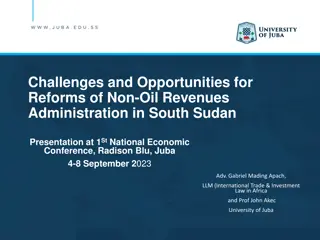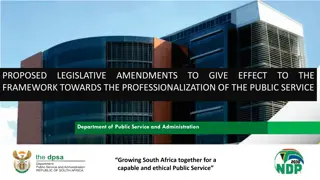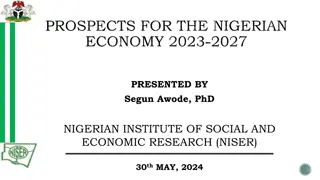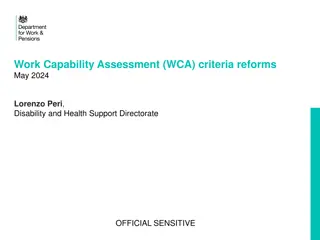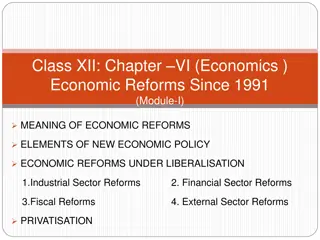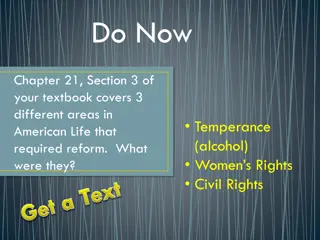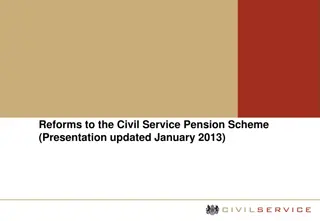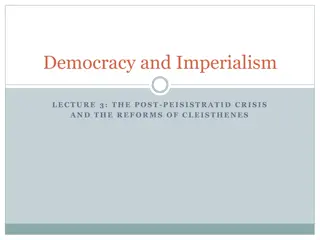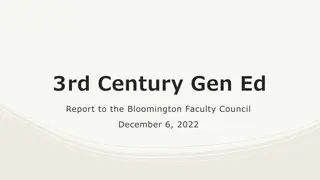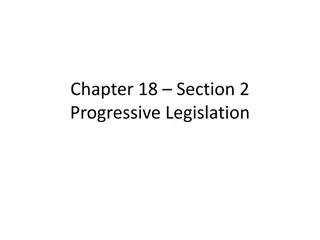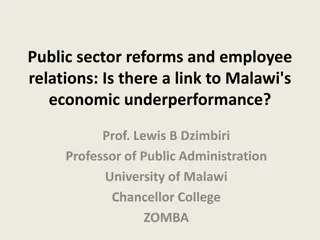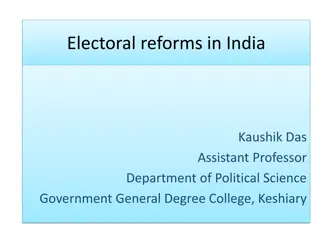Reform Efforts in the Ottoman Empire: 18th and 19th Century Transformations
The Ottoman Empire underwent a series of reforms from the late 18th to the 19th century, aiming to centralize power, boost revenues, strengthen the military, educate bureaucrats, refine legal systems, and improve healthcare. Factors driving these reforms included military weaknesses, separatist nati
0 views • 19 slides
Department of Personnel Management Reforms Workshop Report
This report outlines key business drivers, issues identified, impact assessment, recommendations, and a way forward for the Department of Personnel Management's reforms workshop held in Port Moresby. It discusses the purpose of realigning the public service through cost exercises and controlling exp
1 views • 20 slides
Challenges and Opportunities for Reforms of Non-Oil Revenues Administration in South Sudan
The presentation highlights the reliance on oil revenues in South Sudan and the need for reforms in non-oil revenue administration. It discusses sources of non-oil revenue, factors hindering revenue mobilization, and opportunities for reforms to diversify the economy. The objectives of non-oil reven
3 views • 23 slides
Rise Up, Step Up, Speak Up: DPM Reforms Overview
The Department of Personnel Management (DPM) in Papua New Guinea is undergoing significant reforms to enhance the public service workforce, address issues such as aging staff and inefficiencies, and modernize employment terms. The initiatives include health and life insurance policies, a national ho
0 views • 14 slides
Status of Family Laws in India: Hindu vs. Religious Minorities
The family and personal status laws in India vary between Hindu law and those pertaining to religious minorities. While Hindu law has seen extensive reforms, discriminatory provisions still exist. In contrast, laws governing religious minorities have undergone fewer reforms, leading to greater inequ
2 views • 4 slides
Proposed Legislative Amendments for Professionalization of Public Service
This presentation outlines proposed legislative reforms to enhance the professionalization of the public service in South Africa. Key areas targeted include managing the political-administrative interface, training and development of employees, promoting ethical conduct, and more. Priority legislati
1 views • 8 slides
Comprehensive Overview of Basic Education Laws Amendment (BELA) Bill B2-2022
The presentation discusses the purpose and intent of the amendments proposed in the BELA Bill B2-2022, addressing challenges to transformation in the education system. It highlights the need for legislative reforms to enhance accountability, improve learner admissions, and empower education authorit
3 views • 88 slides
Prarthana Samaj
Prarthana Samaj, meaning "Prayer Society" in Sanskrit, was founded in 1867 by Atmaram Pandurang with the objective of promoting belief in one God and advocating worship of the same. The movement gained traction when Mahadev Govind Ranade joined, with intellectuals advocating social system reforms. I
5 views • 12 slides
Prospects for the Nigerian Economy 2023-2027: Insights and Analysis
Nigeria's economic journey from 1999 to the present, highlighting key administrations, policy shifts, and economic reforms. The period saw the establishment of democratic governance, economic diversification efforts, infrastructural investments, and bold reforms such as fuel subsidy and exchange rat
0 views • 39 slides
Work Capability Assessment (WCA) Criteria Reforms May 2024
The Work Capability Assessment (WCA) determines if individuals claiming ESA and/or UC have limited capability for work (LCW) or work-related activity. Reforms aim to better support disabled individuals to engage with work. Consultation responses highlighted the need for changes in assessing disabili
0 views • 6 slides
Government Services Reforms in Vanuatu Public Service Commission
Chairman Martin Mahe is leading innovative reforms in the Vanuatu Public Service Commission to improve service delivery. The focus is on a robust legislative framework, clear procedures in the Public Service Staff Manual, rigorous performance management, and policy development for effective decentra
0 views • 10 slides
Financial Sector Reforms in India: An Overview
In the early 1990s, India witnessed significant reforms in its financial sector, addressing issues like lack of transparency, extensive regulation, and financial repression. Key reforms included setting up expert committees, reducing SLR and CRR, implementing prudential norms, and deregulating inter
0 views • 18 slides
Education Reforms in India: Wood's Despatch and the Impact of Macaulay's Minute
The background leading to Wood's Despatch in 1854 in India, following the Charter Act of 1813 and 1833, marked significant changes in the educational landscape. The shift towards English education, influenced by Macaulay's Minute, had both positive and negative impacts on the Indian education system
0 views • 29 slides
Implementing Curriculum Reforms in Under-resourced Contexts: Lessons from Uganda
Explore how Uganda is implementing curriculum reforms in under-resourced contexts to address the quality of education and graduate employability. The discussion delves into the challenges faced in the Ugandan education system, the introduction of a competency-based lower secondary curriculum, and a
1 views • 21 slides
Enhancing Education in Uganda: A World Bank Initiative
The World Bank's portfolio in Uganda focuses on addressing challenges in the education sector such as high dropout rates, declining learning outcomes, and limited access to education, especially for women and girls. The response includes initiatives to improve service delivery, strengthen equity, an
1 views • 18 slides
Hunter Commission 1882 - Education Reforms and Recommendations
The Hunter Commission of 1882 was established by Lord Ripon to investigate and reform the education system in India. It aimed to improve primary education, evaluate missionary efforts, and recommend changes in government institutions. The Commission emphasized the importance of providing education i
0 views • 9 slides
Economic Reforms Since 1991: Liberalisation and Industrial Sector Reforms
Economic reforms initiated in 1991 under the New Economic Policy focused on liberalisation, privatisation, and globalisation to accelerate economic growth. Liberalisation involved deregulation of the industrial sector, abolishment of industrial licensing, reduction of public sector industries, de-re
0 views • 9 slides
Progressive Reforms and Social Movements in American Life
The Progressive era in American history saw significant reforms in three key areas: Temperance (alcohol), Women's Rights, and Civil Rights. Various laws, organizations, and individuals played crucial roles in driving these reforms, such as the 18th Amendment, the National Woman's Party, the 19th Ame
0 views • 7 slides
Evolution of the Kenyan Water Sector: Reforms and Innovations
The Kenyan water sector has undergone significant reforms and institutional changes over the years. Beginning with the establishment of the Ministry of Water in 1974, followed by the enactment of the Water Act 2002 and subsequent reforms, new institutions such as WASREB, WSBs, WRMA, and WSPs were cr
0 views • 15 slides
Structuration Analysis of Central Government Accounting Practices and Reforms in Emerging Economies: A Study from Nepal
Delve into the nuances of central government accounting practices and reforms in emerging economies, focusing on Nepal. The study explores why key stakeholders resist externally-driven changes, investigates the unintended consequences of reforms, and highlights the role of organizational actors in s
0 views • 21 slides
Need for Changes in the Law of Evidence: Perspectives and Reforms
Information by which facts are proved forms the essence of the law of evidence, regulating how facts are established in courts. This article discusses the exclusionary ethos, statutory reforms, challenges with hearsay evidence, and examples of reforms from different countries like England, Wales, Au
0 views • 18 slides
Evaluation of Labour Reforms 1945-51 and Their Impact on Poverty Alleviation
Following their landslide victory in 1945, the Labour Government under Clement Attlee implemented a series of reforms aimed at addressing poverty in post-WWII Britain. The Beveridge Report highlighted the giants of poverty - Want, Disease, Idleness, Squalor, and Ignorance - serving as the blueprint
0 views • 29 slides
EHEA Ministerial Conference - Paris 2018 Agenda
The EHEA Ministerial Conference in Paris 2018 includes various sessions and discussions on the future of higher education in Europe. The agenda features welcome sessions, ministerial allocutions, policy forums, and adoption of communiqués focusing on fundamental values, inclusiveness, and EHEA refo
0 views • 8 slides
Overview of Aged Care Reforms in May 2014
Aged Care Reforms in May 2014 introduced significant changes to the aged care sector in Australia. The reforms aimed at providing quality care for older Australians, reducing red tape, and enhancing services such as Home Care Packages, MyAgedCare, and the Australian Aged Care Quality Agency. Changes
0 views • 45 slides
Early Childhood Education and Care in Croatia: Overview and Reforms
Early Childhood Education and Care (ECEC) in Croatia has evolved over the years with reforms targeting parental leave, family benefits, and preschool programs. The system includes nurseries, kindergartens, and preschools, with public providers dominating. Recent reforms have introduced quality stand
0 views • 19 slides
Overview of Civil Service Pension Scheme Reforms
Explore the recent reforms in the Civil Service Pension Scheme, covering changes in contributions, introduction of a new pension scheme, reasons for the reforms, current scheme details, and the transitioning stages. Understand the impact on pension benefits and find resources for further information
0 views • 23 slides
Labor Market Reforms and Unemployment: A Detailed Analysis
Labor market reforms and their impact on unemployment rates are examined through a Difference-in-Differences analysis in this study led by Armingeon and Baccaro in June 2013. The research questions whether liberalizing reforms actually reduce unemployment and increase employment levels. The findings
0 views • 13 slides
Athenian Democracy: Post-Peisistratid Crisis and Cleisthenes's Reforms
After the rule of Peisistratus, Athens faced a crisis that led to the reforms of Cleisthenes. Solon's reforms had set a foundation, but tensions remained between rich and poor. The Solonic constitution established a system involving magistrates, the Areopagus Council, and the Assembly. The interplay
0 views • 22 slides
Task Force Report on Future Reforms in General Education at Bloomington
The Task Force Steering Committee at Bloomington has been assessing and reporting on the future of general education, aiming to recommend evolutionary changes in requirements and structure without the need for additional credits or courses. Various inputs such as archival documents, best practices r
0 views • 37 slides
Reforms in GCSE, AS, and A-Level Education in England
Reforms in GCSE, AS, and A-Level qualifications in England aim to align the educational system with global standards, enhancing the rigor of content and assessments. Changes include new grading scales, stand-alone AS qualifications, and expanded subject offerings. These reforms impact students start
0 views • 30 slides
Progressive Reforms in the United States
Progressive movements in the United States during the late 19th and early 20th centuries led to significant legislative changes at the federal, state, and municipal levels. Efforts focused on expanding the role of government in social welfare programs, municipal reforms to combat corruption, innovat
0 views • 10 slides
Public Sector Reforms in Malawi: Impact on Economic Performance
The presentation explores the link between public sector reforms and economic underperformance in Malawi. It discusses the history of public sector reforms in Africa and Malawi, employee relations, and various generations of reforms. The context of Malawi's economic realities at independence and res
0 views • 63 slides
Understanding Electoral Reforms in India
Electoral reforms in India are crucial for ensuring free and fair elections, which are fundamental to the success of democracy. This article delves into the need for electoral reforms in India, discussing issues such as money power, muscle power, criminalization in politics, and the misuse of offici
0 views • 15 slides
Inclusion Programme & SEND Reforms in Sheffield Update for School Governors (June 2016)
Sheffield is undergoing significant reforms in its inclusion programme and SEND services, aiming to provide better support for vulnerable young people and their families. The vision includes a shift towards a locality model, ensuring high-quality inclusive provision, robust mental health support, an
0 views • 13 slides
Challenges and Options for Ensuring Affordability in SEND Funding
Northumberland County Council faces funding challenges in providing support for Special Educational Needs and Disabilities (SEND) due to lower government funding levels, increased demand for SEN places, and existing financial burdens. The 2014 national SEND reforms have highlighted the need for sust
0 views • 10 slides
NSW Consent Reforms: Legislative Changes and Impacts on Sexual Assault Laws
In the past 40+ years, the NSW legislative landscape has seen significant changes in addressing sexual assault, culminating in the recent Crimes Legislation Amendment (Sexual Consent Reforms) Act 2021. These reforms implement recommendations, introduce affirmative consent model, and enhance provisio
0 views • 32 slides
Understanding the Reforms of GCSE Qualifications and Grading in HE Admissions
Delve into the changes in GCSE qualifications for Higher Education (HE) admissions. Explore the timeline for reforms, implications on grading structure, and new standards set for GCSEs. Gain insights into the introduction of a new numbered grading scale and the significance of the National Reference
0 views • 14 slides
Big Bang Reforms in China's Financial Sector by Sunanda Sen
This article discusses significant reforms in China's financial sector, including changes in capital account regulation, balance of payments components, financial instabilities, and offshore centers like Shanghai FTZ. The reforms cover topics such as exchange rate adjustments, deregulated interest r
0 views • 8 slides
Academic Guidance Challenges and Reforms in French Higher Education
French higher education faces complex challenges in academic guidance, with a traditional system not prioritizing individual student needs. Recent reforms aim to provide better support and personalized education paths, addressing issues of student success and institutional selection processes.
0 views • 7 slides
Deep Dive into Nikita Khrushchev's Reforms and Removal from Power
Explore the transformative reforms and eventual downfall of Nikita Khrushchev during his tenure from 1956-1964. Delve into topics like Cold War dynamics, agricultural reforms, de-Stalinization, control of Eastern Europe, and reasons for his removal from power. Uncover the debates surrounding the ext
0 views • 7 slides


